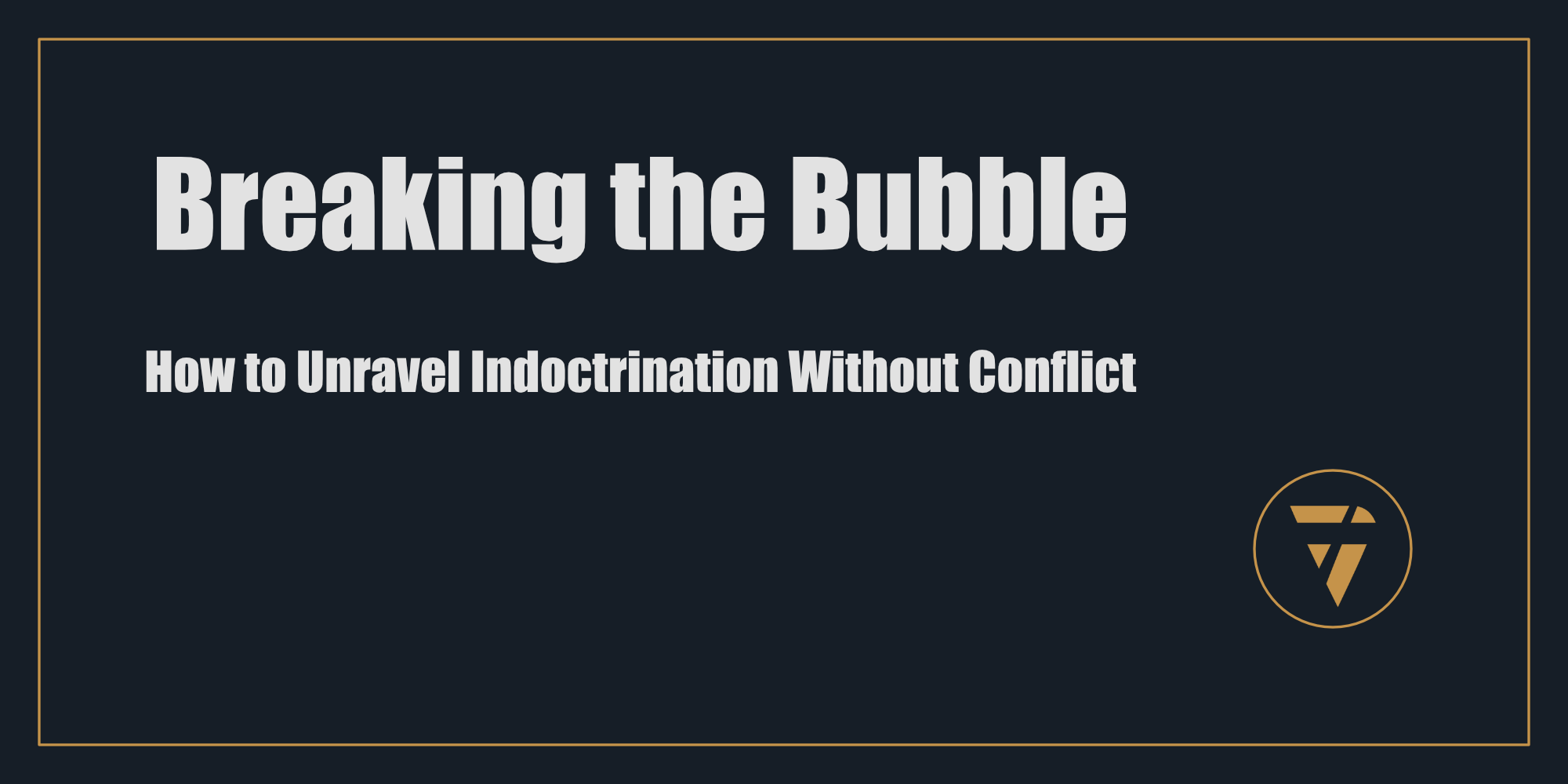Breaking the Bubble

How to Unravel Indoctrination Without Conflict
We live in an era of information overload and selective truth, where entire worldviews are constructed not from firsthand knowledge, but from media narratives, political rhetoric, and social bubbles. Many people believe they are well-informed, yet their understanding of the world is artificially limited—not necessarily by lack of intelligence, but by the controlled flow of information within their chosen ideological or cultural framework.
This isn’t just an American problem. It’s a universal challenge seen in the UK, Canada, Australia, and beyond. But in the US, where the media landscape is uniquely fragmented and profit-driven, entertainment has replaced journalism, and critical thinking has been substituted with identity politics and tribal loyalty.
How do you break someone out of this cycle without pushing them deeper into defensiveness? Not by arguing. Not by presenting facts they will instantly reject. The real solution is exposure and curiosity—letting them unravel their own worldview piece by piece, as they discover the limits of their own understanding.
The Psychology of Indoctrination: Why People Resist New Information
To change a person’s mind, you first need to understand why they hold their beliefs so tightly.
- Identity & Belonging – People don’t just believe things because they are factually correct; they believe them because their community does. Challenging their beliefs feels like a betrayal of their social group.
- Cognitive Dissonance – When new information contradicts their worldview, it causes psychological discomfort. Instead of reconsidering, they often double down.
- Media Reinforcement – The more someone consumes one-sided media, the more they believe alternative perspectives are not just incorrect but dangerous or deceitful.
- Emotional Anchoring – Many people hold beliefs not because of evidence, but because of an emotional connection. Fear, anger, and nostalgia drive their views more than logic.
If you challenge their belief system head-on, they see you as the enemy. If you make them explain their beliefs, they start seeing the cracks on their own.
The Strategy: Asking the Right Questions
The key is to be their guide, not their opponent. Let them walk themselves into uncertainty, using questions that demand deeper thought.
Instead of: "You're wrong. Here's why."
Say: "That’s interesting, where did you learn that?" or "Really? I want to know more!"
Instead of: "Your source is unreliable."
Say: "Where can I hear more?"
Instead of: "That’s misinformation."
Say: "What would make you second guess that?"
Every belief has an origin story. Most people never investigate where their own ideas come from. The more you trace their beliefs back to their sources, the more they realize their knowledge is based on the repetition of distributed scripting, not independent thought.
Case Study:
The ‘CBC is Propaganda’ Argument – A Targeted Breakdown
In Canadian right-wing circles, an American-imported distrust of public broadcasting has taken hold, mirroring attacks on NPR and the BBC. The claim? That the CBC (Canadian Broadcasting Corporation) is nothing more than government-controlled propaganda.
But like most manufactured narratives, this belief doesn’t hold up under scrutiny. The goal here isn’t to argue—it’s to expose the flaws in their logic using precision questioning.
🔹 Them: "The CBC is just government-controlled fake news!"
✔ You: "I've had that feeling too. What did you find?!"
🔹 Them: "Well, Trudeau funds them!"
✔ You: "Always follow the money!! I love looking at financials, can I see what you found?"
🔹 Them: "No, but CBC gets $1.2 billion in tax money, so they have to do what the government says."
✔ You: "Yeah, there are way too many positive stories about Justin from CBC. Some of them make me sick. What was the worst one you saw?
🔹 Them: "Well… I trust independent media like Rebel News."
✔ You: "Yeah, I hope they can stay independent. You already said that whoever gives the money, gets the say. Where do they get their money from?"
🔹 Them: "But the government funds them! That’s the problem!"
✔ You: "I don't think the government should fund anything either. We should talk about ways we can boycott things that the government funds."
🔹 Them: "Well, that’s different!"
✔ You: There may not be answer to this one. And sometimes there just is not reasoning with ignorance and hate. In that case, all you can do is prevent their ability to harm others.
At this point, they have nowhere to go. They’ve relied on:
- Repetition, not evidence – They cannot cite a single instance of CBC taking government orders, because they don't.
- Contradictions – When CBC criticizes Trudeau, they say it's a trick. When Rebel News gets funding from partisans, they call it "independent."
- An illogical standard – They believe government funding taints journalism, but not policing, military, or healthcare.
Instead of telling them they’re wrong, you’ve made them prove it to themselves—and they’ve come up short.
The key isn’t to defeat them—it’s to leave them questioning their own certainty. And once doubt creeps in, they start looking for answers beyond their echo chamber. Hopefully.
Again, don't expect this to work. But it's worth trying.
Every mind turned to reality is a generation of futures free from slavery.
The Turning Point: When People Start Questioning Themselves
The best part of this approach? They think they changed their mind on their own.
When someone realizes:
❌ Their news sources are unreliable.
❌ Their arguments don’t hold up under scrutiny.
❌ Their worldview is based on repetition, not analysis.
They become more open to real information.
Not immediately. Not overnight. But you’ve planted the seed.
Encouraging Curiosity
Once you’ve guided them to realize they don’t know enough, don’t push facts on them. Instead, invite them to learn more on their own:
✔ "That’s an interesting question—maybe look into how European healthcare works and let me know what you find?"
✔ "It’s worth checking out other perspectives. Have you ever read Reuters, or Al Jazeera’s take on this?"
✔ "I’d love to hear what you think after looking at more sources. Let’s talk again after you check out more."
When people feel like they are in control of their own learning, they are more likely to explore.
Leading Without Forcing
Most people are not intentionally ignorant—they're just comfortable in their information bubble. If you confront them, they retreat. If you ask the right questions, they move forward on their own.
Every christo-fascist nazi monster was deliberately made to be what they are. Created and carved to a uniformity of man.
This isn’t about winning debates. You can't win. Because they're not debating. It’s about helping people think more critically.
Helping them to see what they are.
No shouting. No arguing. Just gently exposing the limits of their worldview, until they start breaking their own bubble.
Some people can't.
But if they do?
They can never fully go back.
This is what I’m working on. Tell me what you think, I enjoy the conversation! Subscribe and follow the work in real time.
Thanks!
B

If government funding makes CBC 'propaganda,' does that mean publicly funded police, roads, hospitals, and schools are too? It seems to be.
Or is it just journalism that scares you? Facts? Reality?
PS -






